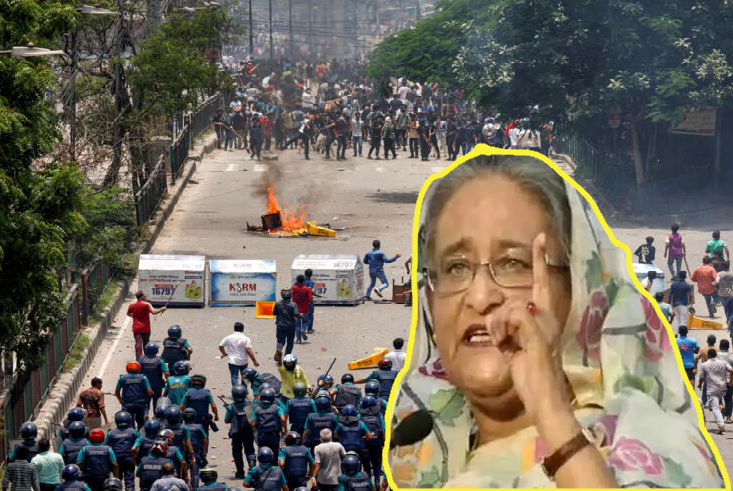
- The main reason for the protests is the government’s job reservation policy, which allocates 56% of government jobs to the descendants of those who fought in the 1971 war for independence.
- In response to the unrest, the government has labelled the protesters as ‘Razakars,’ a term used for those who sided with Pakistan during the 1971 war.
- Prime Minister Hasina has publicly accused the United States and European countries of conspiring against her government.
Bangladesh has been experiencing significant unrest since July 1st. There have been ongoing protests involving students and the Bangladeshi government. As of now, more than 100 people have died, and almost 1,500 have been injured. This protest is one of the largest in Bangladesh’s history and the biggest against Prime Minister Hasina in recent times.
Reason for Protests
The main reason for the protests is the government’s job reservation policy, which allocates 56% of government jobs to the descendants of those who fought in the 1971 war for independence. The students argue that this quota system is unfair and does not provide equal opportunities for all citizens. They demand that the quota be reduced to 5%, ensuring more equality in job opportunities.
Moreover, the students believe that the quota system disproportionately benefits supporters of the Awami League, the party that led the independence movement in 1971. They claim that the reservation system is being used to favour Awami League supporters over others.
The protests began at the University of Dhaka, one of the largest universities in Bangladesh, and quickly spread to other parts of the country.
The protests began at the University of Dhaka, one of the largest universities in Bangladesh, and quickly spread to other parts of the country. The government has responded to the protests by imposing curfews across Bangladesh and introducing restrictions on student gatherings. The situation escalated on Thursday, leading to significant violence and multiple casualties. Many protesters have been detained.
In response to the unrest, the government has labelled the protesters as “Razakars,” a term used for those who sided with Pakistan during the 1971 war. This label is intended to discredit the protesters by associating them with traitors to the Bangladesh independence movement.
The situation remains tense, with significant restrictions in place and ongoing efforts by the government to control the protests.
Conspiracy against PM Hasina?
Political experts have noted that this protest in Bangladesh is not explicitly an anti-Hasina movement, as it primarily involves students opposing the government’s job reservation policy. The protests do not yet include professors, professionals, or the broader civilian population. However, it is expected that the scope of the protests may expand over time.
There is speculation about whether there are external or internal influences behind the protests, but it is too early to confirm any involvement. The timing of these protests is noteworthy, coinciding with longstanding accusations by Prime Minister Hasina’s government against Western countries, particularly the United States and some European nations. These accusations suggest that there has been a historical pattern of Western interference in Bangladesh, whereas per PM Hasina, the USA is trying to create a new Christian country.
The students argue that this quota system is unfair and does not provide equal opportunities for all citizens.
Prime Minister Hasina has publicly accused the United States and European countries of conspiring against her government. These accusations have gained attention recently due to Hasina’s controversial statements regarding alleged American interference in the region, particularly in northeastern Bangladesh and neighbouring areas, including Myanmar and parts of northeastern India.
While no concrete evidence or formal investigation confirms any external involvement in the current protests, past accusations and recent geopolitical tensions raise questions about possible influences. The situation remains complex, and further developments may shed light on any potential external or internal factors at play.
(Views expressed are the author’s own)
Aayush Pal is a freelance writer on contemporary geopolitical developments. The views expressed in his work are entirely his own.
